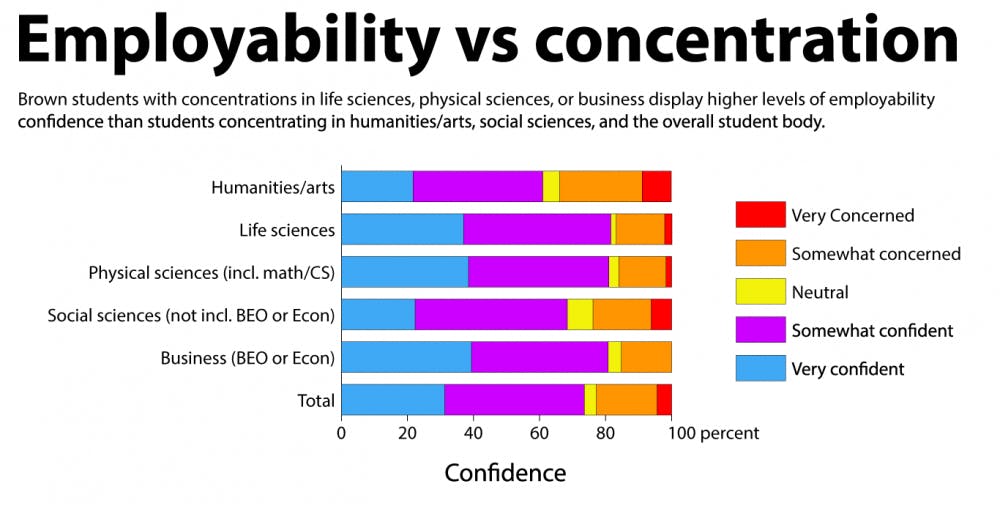Computer science students can schedule meetings with tech company recruiters who pay to meet them, while humanities students may occasionally get job announcements in their inbox.
With such different recruiting efforts, it may be no surprise that The Herald’s fall 2017 poll found that humanities concentrators are at least two times as concerned as life sciences, physical science and business, entrepreneurship and organizations concentrators about finding employment after graduation.
“It’s less of a structured path” for humanities concentrators, said Dominique Pariso ’18, a double concentrator in English and modern culture and media.
The waves of on-campus recruiting for consulting, tech and finance have already taken place, “whereas you don’t even start applying as a humanities student until next semester, so that can produce anxiety amongst humanities students,” she added.
In addition to the difference in hiring timelines across disciplines, post-grad employment is also more integrated into concentrations such as BEO and computer science. The Industry Partners Program, run by the computer science department, facilitates communication between technology firms and current concentrators.
When a company approaches the computer science department and expresses interest in recruiting its students, “we can help them set up with advertising the event, booking rooms, ordering food, getting students there and setting up things like mock interviews and resume reviews,” said Jeff Huang, assistant professor of computer science and the director of Industry Partners Program. “It’s very convenient for the companies and the students.”
Currently, the Industry Partners Program has 27 member companies, including large tech companies such as Google, Facebook, Microsoft and Adobe. Member companies donate between $500 to $25,000 a year to be a part of the program.
Current CS concentrators find these recruitment efforts helpful. “During the recruiting season, companies come all the time,” said Ansel Vahle ’18, a double concentrator in computer science and classics. “CS is somewhat pre-professional. They just want you to succeed,” Vahle said.
The BEO department also has a distinct recruiting culture that may contribute to current concentrators’ high employability confidence. Seniors concentrating in any one of the department’s three tracks — economics, organizational studies and entrepreneurship and technology management — are all required to enroll in the capstone course.
According to BEO concentrator Kyle Haber ’18, the capstone course “assimilates (BEO students) into what we would be doing in an actual job.”
In the class, student groups are paired with businesses across the country and meet regularly with mentors both at Brown and from the companies, culminating in a presentation about potential innovations.
“You get a feel for whether or not that’s something you want to do,” said BEO concentrator Miki Ljuboja ’18.
The BEO curriculum also includes lectures on topics such as professional behavior, business ethics, speech presentation, research methods and contract negotiation, Haber added.
The emphasis on pre-professionalism is less pronounced in the humanities departments. “We don’t do job training or professional training in the department, though we do circulate companies and private firms and other kinds of fellowship opportunities that approach us” through email lists, said Philip Gould, professor and chair of the English department.
In the spring, the department hosts a panel of alums working as writers who come back to talk with current concentrators.
“I’ve been limiting it to writers, but it would be great if we could do it for anybody who has an English degree,” said Catherine Imbriglio, senior lecturer and nonfiction honors advisor in English.
Although Jessica Steans-Gail ’16, who graduated with a degree in urban studies, acknowledges that the job process “is more opaque, or at least less streamlined, in the humanities in general,” she isn’t certain that this necessarily means getting hired is harder for humanities majors.
“It seems from the outside that it’s easier to find a job in computer science or engineering or consulting. … The whole process is far less streamlined across the board in the humanities because they’re not recruiting in the same way, because they don’t have the same volume of new hires,” Steans-Gail said. After a year-long, on-and-off job search, she now works as a content writer for the app of a Broadway musical.
For humanities and social science concentrators, a challenge of the job hunt is finding out how to mold skills learned in school to fit a job description, said Sarah Atkinson ’16, who graduated with a degree in political science. “The people in STEM have an easier time because they can search what they did and find jobs. It was harder for me because I had to figure out what I could actually do,” said Atkinson, who now works at a small consulting firm after completing post-grad internships in marketing and journalism.
“There can be a general feeling of, ‘What professional skill am I learning in the humanities, or even to some extent in the social sciences?’” said Matt Donato, director of CareerLAB. “I think the question to be asking is how do the skills that I as a student am learning in any discipline that I’m studying translate into the types of career paths that I want to pursue?”
Additionally, anxiety about employment among humanities students can be heightened by the myth that all STEM and business concentrators get hired in the fall, said CareerLAB Career Counselor Ron Foreman.
“It seems to (humanities concentrators) that everybody studying CS, or everyone who’s pursuing finance or consulting, gets a job through on-campus recruiting. … While a percentage of those students find a job that way, the majority of them do not,” Foreman said.





